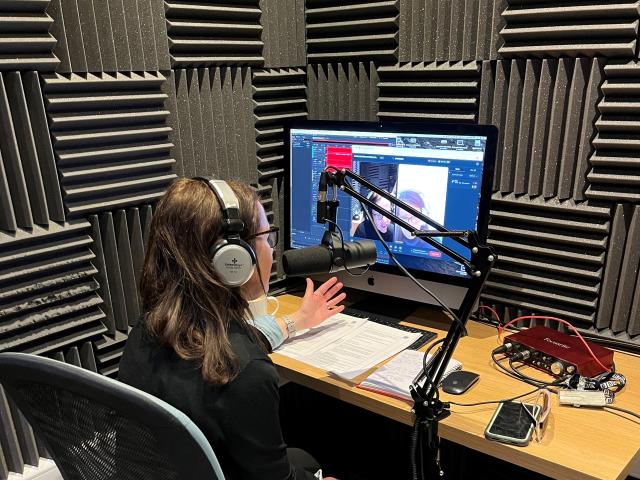
Podcasts
The Where would we be without research? podcast is a deep dive into the world of Welsh health and social care research.
Join our host, science communicator Dr Emma Yhnell, as she immerses herself in conversations with guests looking into topics such as the history of vaccinations, antibiotics, and immunotherapy.
Subscribe to Where would we be without research? wherever you get your podcasts.
Fighting “superbugs” - using research to save humanity with Dr Angharad Davies
Life-saving operations would not be possible without antibiotics, but the medical sciences are battling new infections and antibiotic-resistant superbugs on a daily basis. Dr Angharad Davies, the Health and Care Research Wales Specialty Lead for Infection, talks to Dot Davies about the research that is underway in the fight against the superbugs, one of the major challenges facing medicine today. (Welsh language)
Attack of the killer T-cells - researching the cure for cancer with Professor Andrew Sewell
Our guest this time is Professor Andy Sewell, Professor of Immunology and Wellcome Trust Senior Investigator at Cardiff University. He specialises in T-cell research, which places him at the forefront of research on immunity to infections including SARS-CoV-2, autoimmune conditions like Type 1 diabetes and ankylosing spondylitis and developing cutting-edge new therapies for cancer.
In this episode, host Emma Yhnell hears from Andy about his journey into cancer research, how killer T-cells work in the body and why medical breakthroughs like vaccines are invaluable to humankind. She also gets his take on where human societies would be without research… not very far at all!
Drawing on his wealth of experience in the field of immunology, Andy highlights the importance of research today and touches on the possibility of developing a vaccine for cancer in the near future.
Working with communities in Wales - from boxing to the Butetown mile with Dr Sarah Fry
Dr Sarah Fry is a senior lecturer in Adult Nursing and researcher at Cardiff University. After recovering from a brain tumour in her twenties, she was inspired to turn her attention to cancer research in underrepresented communities in Cardiff.
In this episode, she tells host Emma Yhnell about her own diagnosis, raising awareness of prostate cancer among black men and how researchers can form bonds of trust in the communities they study.
And of course, we ask Sarah the crucial question, Where would we be without research?, to get an idea of why research is so vital for getting more people into clinics and increasing access to healthcare.
Putting postpartum psychosis on primetime TV with Professor Ian Jones
As well as being a Health and Care Research Wales Senior Research Leader, Professor Ian Jones is also director of the National Centre for Mental Health.
Ian’s research focuses on understanding the triggers of women’s mental health illnesses after childbirth, particularly women with bipolar disorder.
20% of women with bipolar disorder are likely to experience postpartum psychosis, compared to just 0.1% of women in the general population. Ian explains how women’s health, and particularly mental health, is under-researched. He expresses the importance of his research, and others alike, to understand the factors that contribute to women’s increased risk of developing postpartum psychosis which will help develop thorough prevention tactics and better treatment.
Ian also gives his insight into the question: Where would we be without research?
Young people’s vital role in shaping research with Sophie Jones
Sophie Jones has been involved in research since the age of 14 after joining a health and social care research engagement project as a teenager. Sophie is now the Senior Public Involvement Officer at DECIPHer and runs ALPHA, a research group designed to find out the views of young people on public health topics.
Working with 14 - 25-year-olds, ALPHA aims to change public health policy by getting young people involved from the start of research. In this podcast Sophie and host Emma Yhnell will discuss the impact young people have on research.
A huge achievement of Sophie’s was her involvement in a campaign to ban smoking in parks. Find out in this episode how she made this change to public health policy in Wales and her answer to our question: Where would we be without research?
History of vaccines - the speckled monster with Dr David Llewellyn
Dr Emma Yhnell - scientist and senior lecturer - is joined by David Llewellyn who has been studying the history of vaccines from the late 1700s to now. He’ll be explaining the importance of combining scientific research with both historical research and collaborative working in his approach to answering the question: Where would we be without research?
Vaccines have dominated conversations in recent years with the COVID-19 pandemic and David, who is the Integrated Wellbeing Networks lead at Aneurin Bevan University Health Board, delves into the history of vaccines, bringing the research back to the current day discussing the research and process behind the vaccines which were produced to combat the global pandemic.
Introducing Dr Emma Yhnell
Where would we be without research? Well, for Dr Emma Yhnell, perhaps not here at all. Emma is a research scientist but also one of IVF triplets born with under-developed lungs. A drug developed in a clinical trial helped her to live the life she lives today.
So, Emma is on a quest to find out what kind of research people like her are conducting day-in-day- out right here in Wales and how it has, and continues to, change lives.
Subscribe to Where would we be without research? wherever you get your podcasts.
Be the first to know about our latest podcast releases and more: